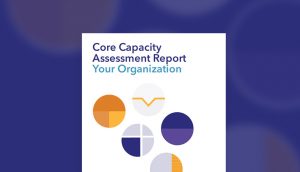Accelerating Your Impact: On-Ramps to Effective Advocacy Funding
Ask any funder what they hope to accomplish, and the answer will likely be “lasting change”. But in the current ever-shifting policy environment, we must recognize that lasting change is increasingly difficult to come by. Deepak Bhargava, President of the JPB Foundation, wrote recently in the Chronicle of Philanthropy that it’s time to change our strategies, saying “We can draw upon a long tradition of effective social change… The key lesson from this tradition: Rather than ‘speak truth to power,’ democracy advocates must build power of their own”.
Supporting advocacy is an essential component of any plan to create meaningful change, especially for foundations, and at TCC Group, we encourage our foundation clients to consider all the tools available to them. Public policy plays a crucial role in creating change to improve conditions for communities and organizations and must be viewed not as an episodic endeavor, but as an ongoing commitment.
Relationships and trust are essential to effective advocacy, and we know that the best ways to build power are building trust and relationships through long-term investment in communities and local leadership, strategic communications, and creating collective vision and strategy. Contrary to what some may think, there are many avenues for private and corporate foundations to legally fund advocacy.[1]
While the idea of funding advocacy may seem daunting to those who are new to it, there are several potential “on-ramps” for funders to start or expand their advocacy funding.
Keep Reading For Some Strategies to Get Started:

On Ramp #1: Creating Opportunities for Learning and Strategizing
Achieving societal change is not a solo endeavor; creating spaces for multiple stakeholders to collaborate, share learnings, and align strategies is crucial. This means funding for organizations to come together to develop advocacy plans that address the root causes of systemic issues and amplify the voices of marginalized communities. It means fostering civic engagement so that communities hold leaders accountable, ensuring that progress is not only achieved but also maintained over time. It also means empowering organizations to influence public policy, shape legislative agendas, and drive social reforms that can lead to widespread and sustainable impact.
Funders can catalyze this action by fostering spaces for collective strategizing, supporting convenings, meetings, and learning communities. By applying their broad perspective across their various grantees, funders can also help identify areas of overlapping interest and opportunities for shared approaches.
Tools To Consider:
Convenings- Convenings can provide an initial pathway to connectivity and collaboration. These opportunities allow for increased knowledge- and resource-sharing, strengthening organizational and programmatic capacity, and enhancing partnerships. We urge funders to be guided by the wisdom of leaders on the ground and begin with listening to better understand the issues, the diverse voices involved, and the most effective format for shared learning and action.
Learning Communities- At TCC Group we define a learning community as a place for organizations that are aligned around shared goals, inquiries, or concerns to come together to intentionally explore new perspectives, share practices and challenges, exchange resources, and mentor and support to expand connections, ideas and knowledge over time. A learning community can be a powerful tool to build trust and collective action and is often a logical next step that follows initial convenings.
 On Ramp # 2 – Building and Supporting the Movement
On Ramp # 2 – Building and Supporting the Movement
Investing in community organizing and helping to cultivate grassroots leaders is another key component of successful advocacy. To be successful, they must utilize a wide variety of strategies and tactics, and the actors working to support or evaluate these coalitions must themselves have a deep and nuanced understanding of the coalition’s structure, strategies, and desired outcomes.
The best solutions will often come from those proximate to the pain. Honor their experience, and approach the work as a partner, one piece of a complex puzzle. Supporting civic engagement, resident voice, and building collective power and solidarity are critical first steps.
Tools To Consider:
Research & Landscape Analysis- Funders, with their 30,000-foot view, can be especially well positioned to support and inform data gathering, landscape analysis, issue briefing papers, and the mapping of key stakeholders, decision-makers, influencers, and power dynamics. These tools can help your grantees, and ultimately policymakers, make more informed and strategic decisions as they pursue the change you all wish to see in the world.
Narrative Change – The stories we see – in film, on social media, and in cultural spaces – can create empathy, challenge beliefs, and change hearts and minds. Investing in communications efforts that focus on developing new narratives can help change societal mindset and action. Ultimately, shifting hearts and minds through strategic communications and narrative change work is pivotal for creating the climate for lasting policy breakthroughs. Investing in storytelling, focusing on values, mapping dominant narratives, and narrative research can lay the groundwork.
Legal Advocacy- Historically, legal advocacy – also known as advocacy through the courts – has been used as yet another tool to advance social change goals. This has often been done by bringing forward a legal court case that focuses on improving a situation for a particular group of people. TCC Group has done extensive interviews with foundation staff to document key lessons learned in funding legal advocacy.
 On Ramp # 3 – Developing Organizational Resiliency
On Ramp # 3 – Developing Organizational Resiliency
Strong organizations can engage in more effective advocacy. In partnership with their grantees, funders can support organizations as they build the skills, knowledge, and relationships to sustain their work over the long haul. For smaller or more limited grantee organizations, awarding grants directly may require more administrative time from foundation staff to support the application and due diligence process.
Tools To Consider:
Flexible Funding- General operating support and multi-year support are a very simple way of allowing institutions the flexibility to allocate funds where they are needed most over time. Flexible funding gives organizations the latitude to respond as needed as advocacy efforts evolve.
Support for New Leaders- In the past few years, there has been a significant shift in the leadership of organizations across the nonprofit sector. There is a new cadre of BIPOC executive directors of nonprofits, and we urge foundations to partner with and support them. This means meeting with new leaders as they reach out and making yourself available to build relationships and trust. It can also mean giving leaders space to connect without interference from funders.
Support Organizational Growth 
You can also help build advocacy capacity through tools, training, and technical assistance. TCC Group’s Core Capacity Assessment Tool (CCAT®) and Advocacy Core Capacity Assessment Tool (Advocacy CCAT) are examples of tools that can help organizations make informed decisions to deepen their capacity by identifying their strengths and challenges.
Which Path Will You Choose?
The path from supporting advocacy to achieving systemic change may be indirect and take years. However, by taking an integrated approach across multiple on-ramps, funders can make smart, strategic investments towards realizing their vision for a more just and equitable world. As Bhargava empathizes, “In an age of cynicism about politics, authentic community connections are the most valuable currency of all.”
[1] Alliance for Justice provides training and education for nonprofits and foundations on the legality of funding and conducting advocacy. See the following resource for links to primers and more advanced resources: https://afj.org/wp-content/uploads/2023/08/Focus-on-Foundations-2.pdf




